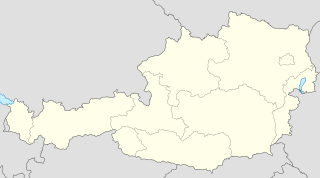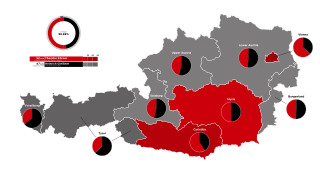
A member of parliament (MP) is the representative in parliament of the people who live in their electoral district. In many countries with bicameral parliaments, this term refers only to members of the lower house since upper house members often have a different title. The terms congressman/congresswoman or deputy are equivalent terms used in other jurisdictions. The term parliamentarian is also sometimes used for members of parliament, but this may also be used to refer to unelected government officials with specific roles in a parliament and other expert advisers on parliamentary procedure such as the Senate parliamentarian in the United States. The term is also used to the characteristic of performing the duties of a member of a legislature, for example: "The two party leaders often disagreed on issues, but both were excellent parliamentarians and cooperated to get many good things done."

The Austrian People's Party is a Christian-democratic and liberal-conservative political party in Austria.
Bicameralism is a type of legislature that is divided into two separate assemblies, chambers, or houses, known as a bicameral legislature. Bicameralism is distinguished from unicameralism, in which all members deliberate and vote as a single group. As of 2022, roughly 40% of the world's national legislatures are bicameral, while unicameralism represents 60% nationally and much more at the subnational level.

Austria is a federal republic consisting of nine federal states. The European Commission calls them provinces. Austrian federal states can pass laws that stay within the limits of the constitution, and each federal state has representatives in the main Austrian parliament.

The Federal Council is the upper house of the Austrian Parliament, representing the nine States of Austria at the federal level. As part of a bicameral legislature alongside the National Council, it can be compared with an upper house or a senate. In fact, however, it is far less powerful than the National Council: although it has to approve every new law decided for by this lower chamber, the latter can—in most cases—overrule the Federal Council's refusal to approve.

Styria is an Austrian federal state in the south-eastern part of the country. With an area of 16,401 km2 (6,332 sq mi), Styria is Austria's second largest federal state, after Lower Austria. It is bordered to the south by Slovenia, and clockwise, from the southwest, by the Austrian federal states Carinthia, Salzburg, Upper Austria, Lower Austria, and Burgenland. The federal state's capital is Graz. In the European Union's vocabulary, Styria is a province.

The Communist Party of Austria is a communist party in Austria. Established in 1918 as the Communist Party of German-Austria (KPDÖ), it is one of the world's oldest communist parties. The KPÖ was banned between 1933 and 1945 under both the Austrofascist regime and the Nazi German administration of Austria after the 1938 Anschluss.

The Greens – The Green Alternative is a green political party in Austria.
An upper house is one of two chambers of a bicameral legislature, the other chamber being the lower house. The house formally designated as the upper house is usually smaller and often has more restricted power than the lower house. A legislature composed of only one house is described as unicameral.

On the federal level, there are two main elections in Austria: presidential elections and elections to determine the composition of the National Council (Nationalrat), the lower house of Austria's bicameral Parliament. The upper house, the Federal Council consists of delegates from the states and is not directly elected. These elections are governed by federal law, which also applies to European Parliament elections in Austria.

A Member of the Legislative Assembly (MLA) is a representative elected by the voters of an electoral district (constituency) to the legislature of State government in the Indian system of government. From each constituency, the people elect one representative who then becomes a member of the Legislative Assembly (MLA). Each state has between seven and nine MLAs for every Member of Parliament (MP) that it has in the Lok Sabha, the lower house of India's bicameral parliament. There are also members in three unicameral legislatures in Union Territories: the Delhi Legislative Assembly, Jammu and Kashmir Legislative Assembly and the Puducherry Legislative Assembly. Only a Member of the Legislative Assembly can work as a minister for more than 6 months. If a non-Member of the Legislative Assembly becomes a Chief Minister or a minister, he must become an MLA within 6 months to continue in the job. Only a Member of the Legislative Assembly can become the Speaker of the Legislature

The Alliance for the Future of Austria is a right-wing populist, national conservative political party in Austria.

Austria, formally the Republic of Austria, is a landlocked country in Central Europe, lying in the Eastern Alps. It is a federation of nine federal states, one of which is the capital, Vienna, the most populous city and federal state. Austria is bordered by Germany to the northwest, the Czech Republic to the north, Slovakia to the northeast, Hungary to the east, Slovenia and Italy to the south, and Switzerland and Liechtenstein to the west. The country occupies an area of 83,879 km2 (32,386 sq mi) and has a population of around 9 million.

Presidential elections were held in Austria in 1951, the first time that the President of Austria had been elected by popular vote. A first round of voting was held on 6 May, and with no candidate achieving a majority of the votes, a second round was held on 27 May between the top two candidates, Mayor of Vienna, Theodor Körner representing the Socialist Party's, and Upper Austria Governor Heinrich Gleißner of the Austrian People's Party. Although Gleißner received the most votes in the first round Körner won the runoff with 52% of the vote.
Upper Hunter, an electoral district of the Legislative Assembly in the Australian state of New South Wales, has had three incarnations, the first from 1859 to 1894, the second from 1904 to 1920, and the third from 1927 to the present.

Legislative elections were held in Cisleithania, the northern and western ("Austrian") crown lands of Austria-Hungary, on 14 and 23 May 1907 to elect the members of the 11th Imperial Council. They were the first elections held under universal male suffrage, after an electoral reform abolishing tax paying requirements for voters had been adopted by the Council and was endorsed by Emperor Franz Joseph earlier in the year. However, seat allocations were based on tax revenues from the States.

NEOS – The New Austria and Liberal Forum is a liberal political party in Austria. It was founded as NEOS – The New Austria in 2012. In 2014, NEOS merged with Liberal Forum and adopted its current name.
Legislative elections will be held in Austria by autumn 2024 to elect the 28th National Council, the lower house of Austria's bicameral parliament.

This national electoral calendar for 2021 lists the national/federal elections held in 2021 in all sovereign states and their dependent territories. By-elections are excluded, though national referendums are included.

The 2021 Upper Austrian state election was held on 26 September 2021 to elect the members of the Landtag of Upper Austria.


















